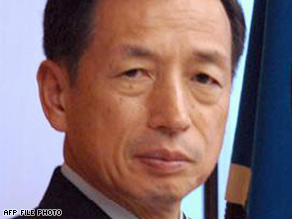(CNN) -- A state-run Chinese newspaper expressed relief Monday that senior Japanese officials had dismissed the country's air force chief after he denied Japan's aggression before and during World War II.

General Toshio Tamogami
Gen. Toshio Tamogami lost his job as chief of staff for Japan's Air Self-Defense Force, the Ministry of Defense said, after saying in an essay that "it is certainly a false accusation to say that our country was an aggressor nation."
Japanese troops invaded China in 1937 and were widely accused of gross human rights abuses, including raping tens of thousands of girls and women and killing several hundred thousand others in what has come to be called "The Rape of Nanking." Imperial Japan also invaded several other Asian nations, leading to the death and misery for an untold number.
Two former Japanese prime ministers have apologized for Japanese aggression before and during World War II. Yet China has long accused of elements within Japan of trying to whitewash the Japanese atrocities committed before and during World War II.
"The denial of the aggression history by Toshio Tamogami comes in as an element of disharmony," the state-run China Daily said a commentary Monday. "Yet, as long as the Japanese government has a right attitude to this question, the smooth development of ties between the two neighbors will not be derailed by such discordant notes."
Tamogami's essay, published late last week, also stirred controversy in South Korea.
Japan controlled Korea from 1910 to 1945. Its military is accused of forcing roughly 200,000 women, mainly from Korea and China, to serve as sex slaves -- they were known euphemistically as "comfort women" -- for soldiers in the Imperial Army.
The South Korean foreign ministry criticized Tamogami's commentary in a statement published by Yonhap, the South Korean news agency.
"His claim is distorting history," the statement said. "International friendly relations are based on repentance for past wrongdoings and learning a lesson from history,"
Tamogami's essay won first prize in a competition called the "True Perspective of Modern and Contemporary History."
No comments:
Post a Comment